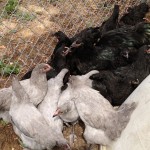Mutual Encouragement
by Rev. Scott Keeble
Samelton lives in southern Malawi. He is a carpenter by trade, which means he occasionally gets hired to build a bench, a bed, a window frame for a neighbor. By and large, Samelton’s family survives on subsistence farming – eating what they are able to grow in their nearby garden.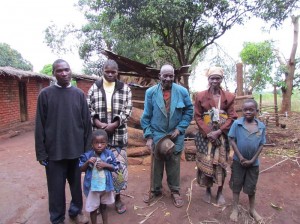
Throughout southern Malawi, life is lived on a razor thin margin. The vast majority of residents (over 85%) live, like Samelton, on subsistence farming. Even short periods of drought can have a devastating effect on the food supply. Additionally, the over six million rural poor in Malawi rely on only a small variety of crops that provide inadequate nutritional content even when there is an abundant harvest. These factors contribute to Malawi’s ongoing struggle with high rates of stunted growth in children, anaemia, vitamin A deficiency, and persistent malnutrition.
In 2007, Copper Creek Church in Champaign, Illinois, started a partnership with a small rural church in southern Malawi. The partnership has a primary commitment to “mutual encouragement by one another’s faith” (Romans 1:12). Over 50 members of the CCC congregation have had the chance to visit Malawi and build this partnership through personal relationships, overnight stays in their homes, shared meals, and joint worship. In our conversations with the elders of Lisanjala Church, clean water and food supply issues have been the most consistent and pressing concerns that have been raised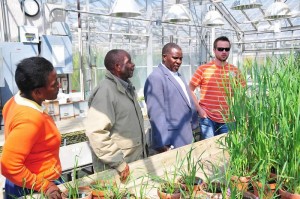
In 2012, 4 members of Lisanjala Church came on a mission trip to the United States and spent 2 weeks strengthening our partnership by sharing life with us in our homes. Imagine seeing an American farm for the first time. Thousands of acres of fields chock full of corn or beans. It was a surreal experience watching them gawk at a tractor as it harvested in 5 seconds more corn than they will grow in a season. And then try to explain that none of that corn is for human consumption. It will feed cows or will become ethanol. How must that sound to people who live with the perpetual possibility of starvation just a dry month away?
Most challenging of all is the question of how to help? On one trip to Malawi, the church leaders led us on a tour of the surrounding villages. We saw perhaps a dozen wells that were broken down, sucked dry, stripped of any useful parts. Nearly all had been funded by well-meaning outsiders who were trying to help. None of them lasted more than a year or two. Any one of them could have provided clean drinking water and irrigation for dozens of families. But none of them had proven to be anything more than a temporary respite. What does food (and water) justice look like in that setting?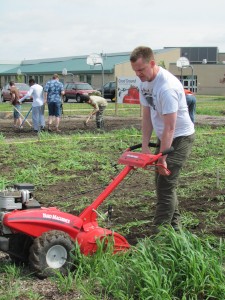
Perhaps the best thing to come out of our partnership with Lisanjala Church to date has been the development of a working relationship with nearby Mulanje Mission Hospital. The staff of MMH have been developing community-based strategies for encouraging the diversification of foods in home gardens and farms. After facilitating a couple of introductions, we stepped out of the way and watched with humble gratitude as MMH and Lisanjala Church developed a plan that is being implemented by the church’s Garden Committee.
The first step was a demonstration garden that was planted right beside the church. Effectively a teaching garden, this new venture allowed the Garden Committee to give villagers a first hand look at new farming strategies and sustainable food products.
After that, each Garden Committee member grew their own personal demonstration garden beside their homes. These gardens have been a critical step in helping villagers buy into the new ideas as they saw those new ideas implemented in their own context by people they knew and trusted. There are currently a half-dozen such gardens in the community and the hope is that each new growing season will see more and more of these gardens planted at homes around the villages.
Even with these new initiatives, access to water remains an issue. CCC is continuing to work with Lisanjala Church and other community-based programs to provide access to water sources that will be sustainable and reliable over the long haul. Without the community-based support structure, any new wells will end up as yet another relic of good intentions abandoned and rusting in a nearby field. This is a work in progress.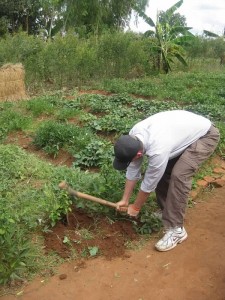
One final outgrowth of this partnership was a community garden here at home. Based on our experiences of seeing subsistence farming first hand, we felt compelled to do a bit of gardening ourselves. On an acre of land owned by our church, we carved out 2 dozen garden plots and made them available to church members and community members alike. This garden opened doors to meaningful conversations with our neighbors and gave us a greater appreciation of what it takes to grow your own food. Much of the produce grown in the community garden was donated to local shelters.
———————
Photos by Rev. Melissa Romero
Scott Keeble pastors a new church plant in Champaign, IL called Copper Creek Church. Scott grew up eating soul food in the deep South. After marrying Melissa (a Californian) he developed a profound appreciation for non-fried food. Melissa also convinced Scott to travel to Malawi, an experience that changed his life. Their entire family now shares a deep love for that country and a concern for the many challenges they face. Scott has dreams of working on a safari camp in Malawi when he retires.



